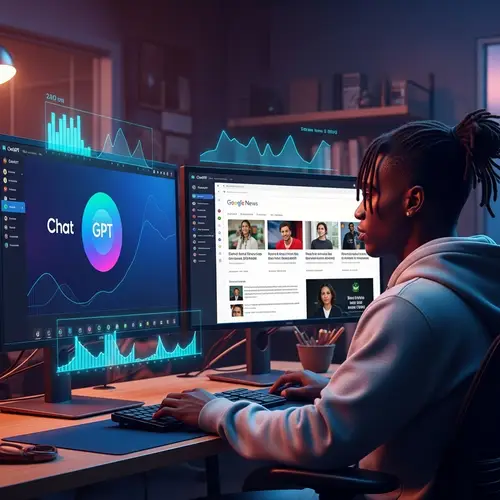How ChatGPT Is Disrupting News Consumption and Search Trends in 2025

The AI elephant in the newsroom
Once upon a time, people turned to trusted broadcasters and newspapers for their morning headlines. Then came Google—fast, convenient, and just a click away. But in 2025, ChatGPT is acting like a wrecking ball through traditional search and news habits, to say the least.
This AI assistant isn’t just summarizing content. It’s influencing what readers see, how fast they get it, and where they go next. News publishers are watching closely—and sometimes nervously—as generative AI changes the rules of the information game.
How ChatGPT is Changing News Consumption

Bite-sized takes for busy minds
Let’s face it—attention spans are shrinking faster than headlines. ChatGPT offers condensed summaries, context, and follow-up questions in a matter of seconds. Instead of scrolling through multiple sites, you get an instant overview in one chat.
This is a major shift. Instead of visiting a news homepage or launching a web search, users ask ChatGPT questions like: “What’s going on in Congress?” or “Summarize the latest on climate policy.” The AI delivers clear, non-clickbait responses, usually without needing to leave the app.
News without the noise
One reason people stick with ChatGPT? No pop-ups, No autoplay videos, and No paywall traps. It’s a quieter way to consume news. And that matters—because digital fatigue is a real phenomenon in 2025. The AI experience feels more secure, more user-centered.
Users curate their own headlines, too. Want just the health updates today? Ask. Curious about sports but only Formula 1? Easy. This kind of conversational filtering is changing expectations about how people receive—and want to receive—information.
ChatGPT vs Google for News Access

The duel for discovery
Google shaped how we seek information. But now its place at the top feels shakier. In a ChatGPT world, users rely on AI-generated updates that skip traditional search entirely.
This flips the model. Instead of typing a keyword and choosing from 10 blue links, users receive a full rundown immediately. They’re not comparing sources—they’re trusting a single AI to do the heavy lifting. Will that trust stick? The jury’s still out.
Speed vs. source control
Google sends traffic directly to publisher sites. ChatGPT often doesn’t. Instead, it pulls together information from multiple places, sometimes without a clear backlink or source listed. For news organizations banking on page views, this is a growing issue.
The convenience of AI summaries is undeniable. But it raises a critical question: How will publishers survive if referrals fall and their original reporting isn’t driving direct clicks?
Impact of ChatGPT on News Publishers

From homepage to ghost town?
In 2025, some news homepages are reporting fewer direct visits. Why? Because ChatGPT is acting as a buffer, giving readers what they need without asking them to click deeper. And let’s be honest—fewer clicks mean fewer ads and lower revenue.
This isn’t just a traffic dip. It’s a business model shake-up. The more people rely on ChatGPT or similar instruments, the harder it becomes for traditional outlets to monetize their investigative journalism.
The licensing debate
Many publishers now want AI platforms to pay for using their content. Large AI models need massive amounts of data. And that data, in many cases, comes from years of journalistic effort. Should AI tools pay content creators the same way streaming services pay musicians?
Some deals are already happening behind closed doors. Others are brewing into lawsuits. Either way, this conversation is just getting started. The outcome will reshape the future of public information access.
AI Trends in Digital News Consumption

Personalized storytelling
What precisely sets ChatGPT apart from the swarm? It adapts to your preferences—even your politics. Over time, it can tailor news delivery in tone, format, and balance. Need today’s headlines in bullet form? Interested in stats-heavy analysis? Done.
This hyper-personalization mirrors social media feeds—but without the echo chamber feel. Ideally, it offers informed variety, not just repetition. The question is, will it really expand worldview or just make it more convenient to stay in a filter bubble?
Voice-first engagement
With smart speakers and phones, voice-based news requests are rising. ChatGPT’s integration with audio platforms means users can now hear daily briefings tailored to their interests—all while getting dressed, cooking, or walking the dog.
This format change isn’t cosmetic—it’s structural. Journalism is being rebuilt around AI-friendly formats: shorter paragraphs, clearer timestamps, and explainer-style summaries. Publishers are designing with AI parsing in mind more than ever.
ChatGPT Referrals to News Websites: A Double-Edged Sword

Traffic: the good, the bad, and the unknown
Here’s the paradox: ChatGPT can direct attention to under-covered stories and smaller outlets. But it may also become the main destination, limiting the incentive to visit original sources.
Referrals happen—but inconsistently. Users often stop at the summary. For legacy publishers used to millions of visits from Google, this inconsistency is more than a hiccup—it’s an existential crisis.
Better engagement, smaller audiences?
Some believe a smaller but deeper audience is better than a large, fickle one. If ChatGPT drives fewer clicks but those users spend more time reading or subscribing, could it balance out?
Early signals suggest mixed results. Some publishers are seeing more engaged readers—when they do arrive. But the volume is lower, and that hits the bottom line.
FAQ
No—but it’s replacing how many people access those sources. Think of it more as a middle layer than a full-on newsroom.
Usually, ChatGPT references sources when asked directly or prompted via plugins. But not all replies include URL links or author bylines.
Yes. Innovations like Google Perspectives and its own AI overviews show that Google is rewriting its playbook. The rivalry is heating up.
They lean toward summaries, context, and topic-based follow-ups. Breaking news, international events, and policy updates are popular requests.
Unlikely. Even with lower traffic, publishers will still need revenue. Expect new formats: sponsored summaries, AI-read ads, and membership nudges inside AI interfaces.
Conclusion: The Next Chapter in News

The impact of ChatGPT on news consumption is evolving fast. It’s convenient, efficient, and adaptable—qualities today’s users crave. But it’s also challenging traditional models of news delivery, referrals, and monetization.
For consumers, this may feel like an upgrade. For publishers, it’s a test. Will partnerships and licensing improve? Can AI become a fair conduit instead of a siphon? These are open questions in 2025.
Curious how your business can adapt content for the AI news era? Let’s investigate it together. Drop us a line and future-proof your strategy today.




